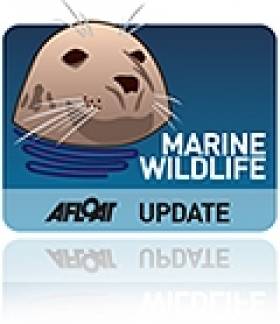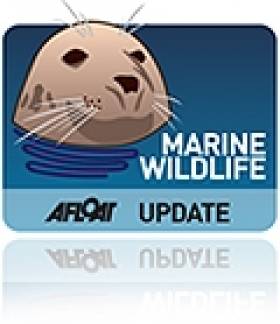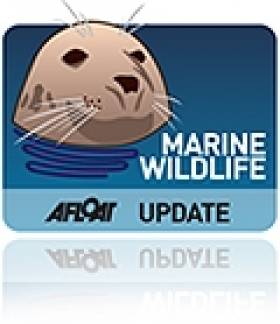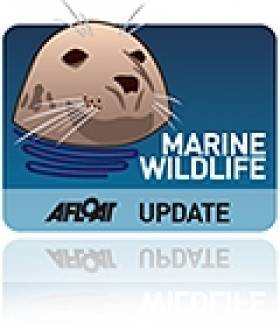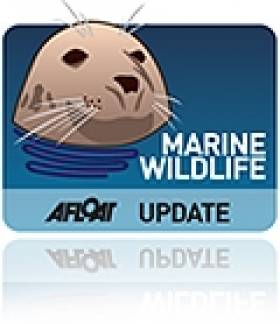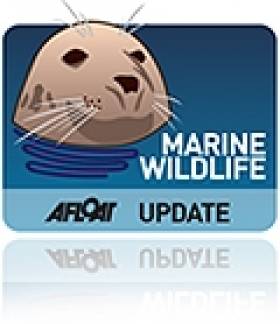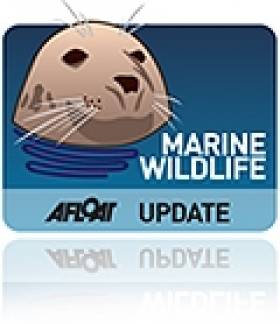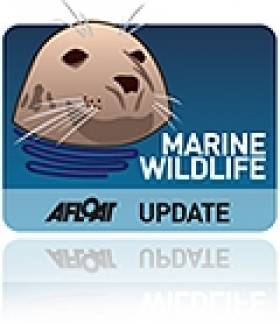Displaying items by tag: Dolphins
Dolphin Superpod Backs Claim For Hook Head As 'The New Dingle'
#MarineWildlife - Talk about a bounty! While it was reported on Afloat.ie just two days ago that whale sightings are on the increase in the Sunny South East as the season draws to a close, that wasn't the whole story.
According to the New Ross Standard, Martin Colfer's whale-watching tour trip last weekend not only sighted a humpback whale and fin whales but also more than 95 dolphins – enough to claim Hook Head as the new Dingle.
It's thought that the warming oceans are bringing cetaceans to Irish waters in much greater numbers than before as they chase their preferred fishy meals.
In other news, locals and visitors at a popular Norfolk beach were wowed by the sight of an enormous whale that washed ashore on Friday afternoon (22 January), as the Irish Mirror reports.
The 50ft sperm whale sadly died despite best efforts to refloat it in deeper waters -- but it's now become something of an attraction on the beach at Hunstanton as investigators work to discover the cause of death.
BBC News reports that the whale was one of as many as five that swam into the Wash inlet of the North Sea, two others of which freed themselves after stranding.
Causeway Coast Is The Place To Be To See Dolphins In Their Element
#MarineWildlife - The Causeway Coast is fast becoming a mecca for dolphins – and dolphin watchers, as the News Letter reports.
Now regularly spotted from the mainland between Ballycastle and Lough Foyle, the dolphins – which may number as many as 70 – are believed to have followed the Gulf Stream as its warm waters have dropped down towards the north coast.
But they're not just here for a holiday, as food is of the essence – hence their habit of approaching boats in big numbers in search of a bite to eat, or in the hopes of stirring up a big mackerel feast.
Rathlin Island appears to be a particular hotspot for the boisterous cetaceans, but Malin Head in Donegal also seems to be within their swimming grounds, as previously reported on Afloat.ie.
#MarineWildlife - Two friends were caught by surprise by a playful pod of dolphins off Donegal's Malin Head in recent days.
And as UTV reports, one of them was quick enough to capture the exciting encounter on video.
“Apparently this area of sea is a migrating route from north to south," said Belfast fishermen Neil McCann, who was holidaying in the area with a friend.
"If you think about that, then Ireland is in the way, so they have to pass around the tip of Malin Head. Fishermen are now calling the area the dolphin capital of Ireland.”
The headland on the Inishowen Peninsula, which marks the northern end of the Wild Atlantic Way, has also been hailed this week for its potential as a 'shark park' reserve, with all the makings of a major marine wildlife tourist attraction.
Stranded Dolphins Saved By Kerry Locals
#MarineWildlife - Common dolphins stranded in a Kerry river last weekend were saved by the quick actions of local people, as The Kerryman reports.
Trapped by the fast receding tide at the mouth of the Cloghane Estuary on the Dingle Peninsula last Saturday (20 June), the group of dolphins were fortunate they didn't have to wait long for the community to spring into action.
Following a report from local woman Shelia Mulcahy, Louise Overy of Dingle Oceanworld and her sister Tabitha co-ordinated efforts that involved area fishermen and landlubbers alike, keeping the dolphins wet till enough people arrived to help move the protected marine wildlife back into deeper waters.
The Kerryman has more on the story HERE.
Dolphins' 'Smiles' Are Not What They Seem
#MarineWildlife - Writing in today's Irish Times, Michael Viney reminds that our friendly relations with dolphins are not always what they appear to be.
Indeed, he repeats the warnings of the Irish Whale and Dolphin Group's (IWDG) Dr Simon Berrow, who stresses that the "smile" on the face of a dolphin is most often misleading.
Recent experiences with the likes of Dusty and Clet on the West Coast prompted Dr Berrow, speaking at a conference in the Netherlands, to recommend a campaign to discourage swimming with wild cetaceans.
At best, such an initiative might avoid such terrible incidents as what happened to Valerie Ryan in Doolin last summer.
But it could also turn around what some experts believe to be a change in the nature of the sociable wild dolphin, one that might be the cause of injuries or even death among the species.
The Irish Times has more on the story HERE.
Dolphin Visitor Makes A Friend Off Aran Islands
#MarineWildlife - 'Bad boy' dolphin visitor Clet may have struck up a beautiful friendship with a fellow 'dolphina-non-grata', according to the Galway Advertiser.
After being spotted earlier this month in Kerry coastal waters, Clet – the French cetacean interloper first seen in West Cork – was thought to be headed towards Fungie's usual haunt around Dingle.
But in recent days he's been spotted off Inis Oírr in the Aran Islands, frolicking with another recent resident of that island.
Sandy is perhaps better known to Afloat.ie readers as Dusty, the Doolin dolphin that was the subject of much controversy last summer after a number of aggressive acts against swimmers, one of whom was hospitalised with serious injuries.
Over the summer it was recorded that she'd made a permanent move across Galway Bay to avoid blasting works in Doolin Harbour.
And now with Clet's arrival, it seems these two dolphins with bad reputations have made the perfect couple, with the Irish Whale and Dolphin Group saying Clet has "hit it right off" with Sandy.
Still, the IWDG has reiterated its warning to swimmers and other water users to stay clear of the pair based on their track record.
In other cetacean news, the Irish Examiner reports on a rare sighting of killer whales off the south-west coast recently.
The seven-strong orca pod was spotted in the Atlantic near the Porcupine Seablight by researchers on the IWDG's Cetaceans of the Frontier Survey cruise on board the RV Celtic Explorer.
Joe.ie has images of the killer whales, which are common to North Atlantic waters but rarely trouble Irish shores; the last significant sighting here was a different orca family in Lough Swilly visiting from Scotland, and believed to be on the 'brink of extinction'.
Elsewhere, BBC News has footage of a large dolphin pod swimming close to the shore in Portrush on the North Coast, in what's described as a "very unusual" occurrence.
And here's a link to last night's RTE television programme on basking sharks.
Dolphins Rescued From Shallows By Kerry Fishermen
#MarineWildlife - Local fishermen came to the aid of what reports describe as as many as 70 dolphins who got themselves stuck in the shallows at a beach in Co Kerry.
According to Independent.ie, the three fishermen – Edward Moore, Declan Kennedy and Maurice Lynch - spotted the large dolphin pod in Smerwick Harbour at they set out to sea at first light yesterday morning (9 September).
The three decided to abandon their day's catch to help rescue a number of juvenile dolphins and their mothers from the beach at Beal Ban.
They were joined in their efforts by Dingle Oceanworld Aquarium director Kevin Flannery, together spending a number of hours herding the dolphins to the safety of deeper water.
Flannery told TheJournal.ie that he suspects the juveniles beached while chasing mackerel, and their calls for help led to the adult dolphins in the pod themselves getting into difficulty in the shallows.
Video Shows Dolphins Joining Gannets In A Feeding Frenzy
#MarineWildlife - The dolphins are at it again! After the recent spectacular superpod that put on a show in Baltimore, artist Vincent Hyland captured this footage of common dolphins in a feeding frenzy with a flock of gannets near Kenmare, Co Kerry.
It's certainly shaping up to be a summer to remember for dolphin watchers in the south-west if this video's anything to go by!
#MarineWildlife - A tip of the hat to @BestBaltimore on Twitter for this video of a dolphin 'superpod' that congregated outside Baltimore Harbour in West Cork yesterday (Thursday 15 May).
Such superpods can comprise as many as 1,000 or more dolphins - so the vast numbers seen here breaching the surface may only have been a fraction of a much larger group.
Early last year researchers captured video of a superpod hundreds of dolphins strong in the Irish Sea, with one describing the scene as "boiling" with the gregarious marine mammals.
Dolphin Dream Comes True For 'Miracle' Irish Twins
#Dolphins - Two Irish boys have had the encounter of a lifetime after getting up close with Florida's famous tail-less dolphin Winter.
As the Tampa Bay Times reports, the formerly conjoined four-year-old twins Hassan and Hussein Benhaffaf travelled to Clearwater to meet the celebrated cetacean, who was the subject of the 2011 movie Dolphin Tale.
The twins are considered "medical miracles" for the extremely low odds of surviving their difficult separation, after they were born joined from the hip to the pelvis and sharing a liver, stomach and bladder.
But for them, getting to meet Winter - who swims with a prosthetic tail after surviving a crab trap - was even more special.
And it was made possible via another Irish connection, Kevin Carroll of the Hanger Clinic - which developed both Winter's and the twins' prosthetic limbs.
The Tampa Bay Times has more on the story HERE.



























